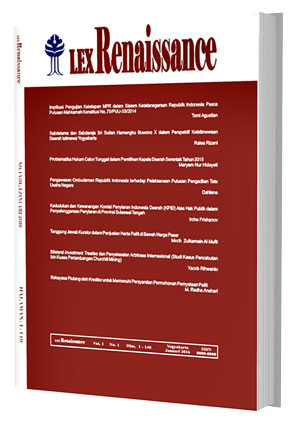Main Article Content
Abstract
Abstract
This study examined the relevance of norms in Article 29 of the 1945 Constitution of the Republic of Indonesia to the principle of Belief in the One and Only God in Pancasila as the state philosophy and an answer to faith crisis. The research aimed to identify the relevance of Article 29 of the 1945 Constitution of the Republic of Indonesia to the principle of Belief in the One and Only God in Pancasila and its feasibility as the highest constitution of the state to overcome the current social problem (crisis of faith). This was normative research with a philosophical approach and a descriptive qualitative analysis model. The study concluded that, first, Article 29 of the 1945 Constitution of the Republic of Indonesia is no longer relevant to the principle of Belief in the One and Only God in Pancasila. Secondly, Article 29 is no longer relevant to answer the issue of faith crisis because the norms do not regulate such matters.
Keywords: Faith; crisis of faith; state philosophy
Abstrak
Penelitian ini mengkaji relevansi norma dalam Pasal 29 UUD NRI 1945 terhadap sila KeTuhanan Yang Maha Esa Pancasila sebagai dasar negara dan menjawab krisis keber-Tuhanan. Tujuan penelitian ini untuk mengetahui relevansi Pasal 29 UUD NRI 1945 terhadap Sila ke-Tuhanan Yang Maha Esa dalam Pancasila dan kelayakannya sebagai konstitusi tertinggi negara dalam mengatasi permasalahan sosial yang terjadi saat ini (krisis keber-Tuhanan). Jenis penelitian adalah normatif, dengan pendekatan filosofis dan model analisis deskriptif kualitatif. Penelitian ini menyimpulkan pertama, Pasal 29 UUD NRI Tahun 1945 tidak relevan lagi dengan Pancasila, sila ke-Tuhanan Yang Maha Esa. Kedua, Pasal 29 tidak relevan lagi dalam menjawab permasalahan krisis keber-Tuhanan karena normanya tidak mengatur hal demikian.
Kata-kata Kunci: Ke-Tuhanan; krisis keber-tuhanan; dasar negaraArticle Details
Authors who publish with this journal agree to the following terms:
a. Authors retain copyright and grant the journal right of first publication with the work simultaneously licensed under a Creative Commons Attribution License that allows others to share the work with an acknowledgement of the work's authorship and initial publication in this journal.
b. Authors are able to enter into separate, additional contractual arrangements for the non-exclusive distribution of the journal's published version of the work (e.g., post it to an institutional repository or publish it in a book), with an acknowledgement of its initial publication in this journal.
c. Authors are permitted and encouraged to post their work online (e.g., in institutional repositories or on their website) prior to and during the submission process, as it can lead to productive exchanges, as well as earlier and greater citation of published work (See The Effect of Open Access).



